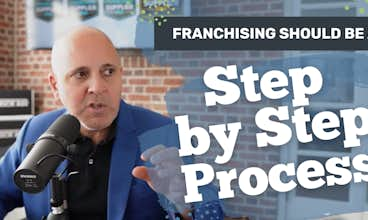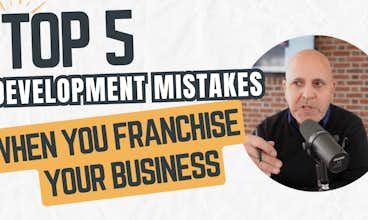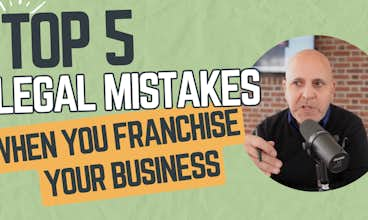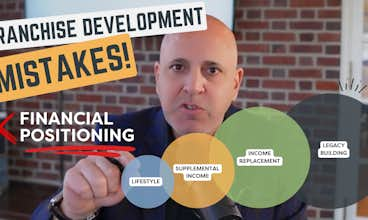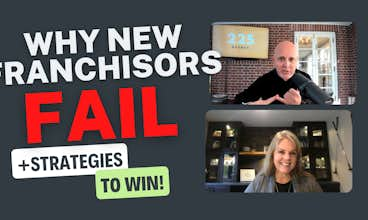Franchising Done Right
- Decide if you should franchise
- Franchise the right way and choose a team
- Approach success strategically
- Get involved in the industry
Franchising is a proven business model that can help successful businesses scale – if it’s done right.
From ongoing revenue streams to vast growth potential, franchising can be an attractive option for successful entrepreneurs seeking ways to take their business to new heights.
As a proven model for scaling a brand, franchising offers an abundance of benefits for business owners looking to grow their company beyond the local market. But as an aspiring franchisor, how can you be sure you’re franchising your business the right way? And how can you avoid common mistakes that might lead to bigger problems down the road?
In this article, we’ll explore best practices for franchising your business – and explain why doing it the right way is critical for long-term success.
Why Franchising?
For business owners seeking new opportunities to grow and expand into new markets, franchising is often the ideal next step.
“Franchising allows you to grow your brand by utilizing other people's capital, utilizing their human capital and operating the business typically in markets they have a geographic presence in. … You can grow much faster when you grow through franchising if, obviously, you bring the right franchisees on and you set your company up the right way,” says Steve Beagelman, a 30-year franchise industry veteran and president and CEO of SMB Franchise Advisors.
In addition to its scaling potential, franchising can also be a source of ongoing revenue for franchisors through fees and royalties paid by franchisees over time – something that often makes franchising even more appealing for successful entrepreneurs hoping to take their business to the next level.
CONTACT US TO LEARN ABOUT HOW WE CAN FRANCHISE YOUR BUSINESS THE RIGHT WAY
Is your business franchisable?
Despite its advantages, franchising isn’t for everyone. Because of that, it’s a good idea to pause and decide whether franchising is right for your business before advancing to the initial stages of franchise development.
“Make sure your business is franchisable. Not every concept is duplicatable or replicable. And if it's not – if you're the only person who can make the pizza in your restaurant every single day, and nobody else can make the pizza as good as you, I get it. But then, how could you franchise your business?” Beagelman says.
In addition to making sure your business is replicable and scalable, take time to determine whether your brand has a history of success, is well-financed, and your trademarks are protectable.
Choose the right time
Beyond franchisability, good timing is key when it comes to franchising. Because franchising too early or too late can have disastrous results for new franchisors, take stock of where your business is – and where it’s headed – before you franchise.
“You could certainly franchise too early. If you just opened your business and you haven't proven the concept, and it's a new industry, it probably isn't the right time to franchise your business. At the same time, you could franchise too late. Did you miss the window that you had to grow your business? That does happen sometimes,” Beagelman says.
If you’re considering franchising your business but aren’t sure if now is the time to do it, check out our article on determining the right time to franchise your business.
Be ready to commit
Franchising requires a serious commitment from franchisors in the form of both time and money. New franchisors should plan to spend between $18,500 to $84,500 to launch their new franchise system, including legal and development fees and the first year of franchise sales.
“I tell people all the time, there's nothing wrong with having a great little regional brand and having three or four locations that you own in a market. That's pretty cool. But if you want to see your brand become bigger, then franchising is a great growth strategy – but you have to be willing to commit not only the financial component but the time component,” Beagelman says.
While franchising a business usually only takes between 90 to 120 days, new franchisors should expect to spend at least five years growing their brand from a startup into a successful, seasoned franchise system.
Franchise the Right Way
Once you’ve determined that franchising is right for you, it’s critical to lay a foundation that will be strong enough to support your franchise system for years to come. Although it won’t be an easy process, franchising can be rewarding if it’s done properly from start to finish.
“It is difficult – it is a new industry – but if it's done the right way, you could slowly scale into it without blowing budgets, without making big mistakes,” says Charles Internicola, a franchise attorney with over 25 years of experience and founder of The Internicola Law Firm.
Choose the right legal team
The franchise industry is complex and highly regulated at the federal level and, in many cases, the local state level. Because of that, having a strong legal framework is necessary for the sustainability of any franchise system.
As a new franchisor, one of the most important actions you’ll take during the franchising process is selecting your legal team. Although consultancies advertising themselves as “one-stop shops” for franchising can be appealing to new franchisors that want to save time or effort during the development process, working with a specialized legal team can be beneficial when it comes to ensuring the legal foundation of your new franchise is rock-solid – even several years after you launch.
“We’ve had to take on a client where they thought everything was good, and it turned out three years later there were legal issues. Because they worked through the franchise consultant, and not the lawyer, they don't have a lawyer to turn to and it's a whole bunch of issues for them,” Internicola says.
Comply with laws and regulations
As a new franchisor, it’s important to address the legal needs of your franchise as early as possible and tackle difficult tasks directly.
“We see it a lot where people are told, ‘Hey, I could license instead of franchising.’ But the laws are designed so you can’t avoid franchise regulation, so chances are, licensing is not an alternative to franchising,” Internicola says, explaining that sometimes business owners try to license their brand to avoid navigating the complexities of franchise regulation – a misguided decision that could have expensive consequences down the road.
Instead, it’s important to make sure your franchise system is set up properly from the start. Because franchise laws and regulations are complex, ranging from the Federal Trade Commission’s Franchise Rule to local state laws that vary by location, working with an experienced franchise attorney to ensure compliance in every jurisdiction your franchise operates in should be a priority during the franchising process.
Develop strong foundational documents
Making sure the necessary documents to start a franchise are properly prepared, legally compliant, and, in some cases, filed with the appropriate agencies, is critical to the success and longevity of your franchise system. As a new franchisor, it’s always a wise decision to seek the assistance of qualified industry professionals when preparing any important documents for your franchise.
Franchise Disclosure Document
The Franchise Disclosure Document is a legal document containing 23 disclosures mandated by the federal Franchise Rule. The items contained within the document include information about the franchisor, the franchise opportunity being sold, fees, financial disclosures and more.
“The FDD is the legal underpinnings (of your franchise). That's the document that you're required to disclose to offer or sell a franchise,” Internicola says, highlighting the document’s importance for selling franchises in the future.
In addition to being mandated under federal law, the Franchise Registration States also require franchisors to register their FDD locally before offering or selling franchises in those states. Because the FDD is a significant legal document regulated by complicated laws at varying levels, franchisors should work directly with a franchise attorney to ensure its proper preparation and legal compliance.
Franchise Agreement
Another critical legal document, the franchise agreement establishes a legal relationship between a franchisor (you) and a franchisee (the party purchasing a franchise opportunity from you).
The franchise agreement should contain information about the legal rights and terms of your relationship with the franchisee, including each party’s obligations to the other, details about initial and ongoing training and support, operating procedures, fees, royalties, territorial rights and more – key factors that can all be important for making or breaking your brand’s future growth.
As a franchisor, the franchise agreement will serve as the most important legal document for defining and governing the legal relationship you have with your franchisees. While it’s okay to work with a franchise consulting firm to determine fee structures and other details, the franchise agreement should always be prepared by an experienced franchise attorney.
Operations Manual
As a seasoned business owner, you’ve probably already established operating systems and procedures for your business. As a franchisor, however, it’s important to make sure those procedures and policies are written down and made accessible to franchisees across the entire system via your franchise operations manual.
“You need a system and a process written down in a manual format that a franchisee is going to follow. It's kind of like their blueprint for operating the business,” Beagelman says.
As a valuable resource for franchisees, the operations manual should communicate your brand’s values and daily operating procedures in a way that ensures consistency across the entire franchise system. Its contents should include contact information for the corporate team, information about incorporating as a business, hiring and firing employees, equipment, supply chain details, training, marketing, business development resources and more. As your franchise system evolves, keep your franchise operations manual updated to reflect any changes.
Approach success strategically
When you’re just starting out in the franchising world, it can be tempting to spend a lot of money on marketing to draw franchisees’ attention to your brand. For new franchisors, that decision can sometimes be a mistake.
“You really need to season and grow organically, initially, and get your footing. Otherwise, you could spend all the money in the world and it's not going to move the needle. It's about being strategic and smart,” Internicola says.
To achieve that organic growth during your first couple of years in business, Internicola advises new franchisors to develop marketing and sales plans early on and build on them over time.
Create a marketing plan
As a new franchisor, it isn’t necessary to develop a full marketing plan at the very beginning. Still, it’s important to establish a strategy for marketing your franchise at a foundational level. No matter how solid your marketing is, though, growth won’t happen overnight. Because of that, new franchisors should expect success to take time – in many cases, years.
“If you are franchising your business, you need to know that your brand needs to season. Your franchise needs to season over the first 12 months, and then 24 months – and there are steps involved,” Internicola says.
Develop a sales process
Once you’ve established a marketing plan to generate interest in your franchise system, the next step is selling franchises after your FDD is issued. To increase the chances of making sales, establishing a consistent sales process is key.
Although each brand has its own system, franchise sales processes typically include the creation of a franchise sales website and compelling brand story, a preliminary discovery call where you or a member of your corporate sales team speaks with prospective franchisees about the opportunity being offered, followed by a more detailed educational and discovery process for serious franchisee candidates, and eventually the disclosure of the FDD before selling a franchise.
Even with a strong sales process in place, though, new franchisors should understand that selling franchises is a marathon – not a sprint.
“One of the most difficult things in the industry is selling franchises. It doesn't happen overnight. You’ve got to put in the time and effort. You can't just go spend a truckload of money and it happens. It's going to be a process over year one, organically, then year two and year three,” Internicola says.
Get involved in the industry
For startup franchisors, the work isn’t finished once the development process is complete and the FDD has been issued. To ensure success over the long-term, networking and ongoing education is critical. One of the best ways to learn the ins and outs of franchising is to network with brokers and other franchising professionals while attending educational industry events.
“That is what makes a successful franchise: empowering yourself and learning franchising, going to conferences. There's so many things you're going to absorb, even subconsciously, in the interactions and meetings with people. … The reason why I think it's so critical (to be involved) is because you need that perspective to know who you should rely on and who you shouldn't, and who you should trust with your money and what investments to make,” Internicola says.
Although going from a startup to a thriving franchise system requires a good deal of time and effort, the rewards can be worth it for franchisors that are willing to roll up their sleeves and involve themselves in the process.
“You have that financial reward, but what I also find is that as our clients grow, there's that personal satisfaction – not just of achieving for themselves, but seeing and being happy with the value they're adding to their franchisees and those relationships,” Internicola says.


